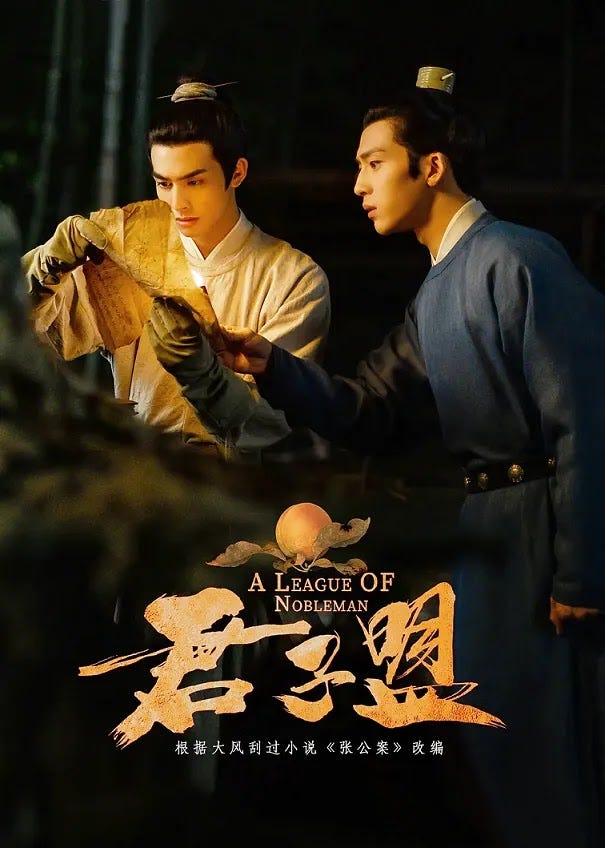10. Echo of a Shout
Keeping up with Danmei fanfiction
Hi there. Welcome to Active Faults.
Nothing encapsulates my last issue more than a video that went viral late last year, with the hashtag #when CPF and solo stans got assigned to the same dorm room#. In this short clip filmed by a third roommate, two college girls first bonded over their shared love for Jason Zhang, a Chinese pop singer. One of them then raised a crucial question: “Wait, are you also a solo stan or…?” to which the other responded, “No, I am a CPF”.
10 seconds of awkward silence ensued. The punchline was the CPF’s later attempt to diffuse the tense moment with genuine curiosity: “So um, what exactly do solo stans do every day?”
She only asked, because a CPF can do so much more than chart-beating, voting, streaming and comments-controlling. The consumption, circulation and production of fanfiction are integral to a CPF’s day-to-day experience, perhaps even more so than their appreciation of the celebrities themselves. If stans worship the celebrity as their God in the church, fanfictions are lore amongst the crowd: words on the street that tell of miracles and visions, hyperbolical rumours and interpretations, whispers over the dinner table about signs of a transcendental glory.
Knitters Unite
Silicon Valley dingdongs misunderstand fanfiction’s financial potential EVERY TIME because they don’t really get that it’s like knitting. The commercial knitwear industry exists, yes, but home knitters knit for the love of knitting. They’re doing it That Way on purpose. They think fan fiction is a “disruptable” industry, ripe for capital harvesting, but it’s not. It’s a collection of hobbyist.
Fan fiction isn’t a quantity situation it’s a quality situation. People aren't logging in to read 100 generic interactions of a couple (ex: what AI fanfic promises) they’re searching for hyper specific elements of human desire. Fan fiction is an emotional artistic response to preexisting media. Like the echo of a shout that grows in complexity. [...]
This is the sort of thing you can’t optimize or manufacture. It is an artisanal experience, every bit of it.
This incredibly eloquent retort from @KaylaAncrum (Twitter) is responding to emerging business initiatives involving the use of services like ChatGPT to mass-produce fanfics, or even make them interactive through AI. And she’s absolutely right: fanfiction, above all, is a labour of love and practice of desire. They are created to be read freely, both in the economic and artistic sense. That, in itself, has always been and will always be a radical act, especially when and if capitalism continues to persist.
Fan fiction is also radical because they battle with fandom’s existential question that I’ve talked about before: what’s real and what’s not? Fan fiction only serves as fabricated scriptures. They are self-woven half-truths about unreachable subjects that can hardly ever be proven in reality or uttered elsewhere. It sits on the precipice of the imaginary and the tangible, will always be closer to us than the subjects themselves. A tangential attempt to pin down figments and wilfully deceive the most wilful readers. It reconstructs the image of its protagonists, feeding into illusions that fans subconsciously held onto as facts.
That explains why danmei, as a genre, is older than danmei fanfiction in China. This is an important distinction. Danmei texts with original characters and storylines are known as yuandan (原耽, short for 原创耽美, original danmei) and danmei fanfiction falls into the category of tongren (同人, literally “same-person”, meaning fan adaptation of preexisting media). Danmei tongren came late to the party because it has an added layer of mischief: it’s bending an established narrative that was likely heterosexual and trespassing the canon by making everyone gay.
The Abnormal, The Strange
First-generation fanfic writers who wrote danmei (known as “slash” in the West) came from the Star Trek fandom. The fans who wanted Captain Kirk and Spock to get together were conscious of their transgression: they were mostly women writing queerness into sci-fi, a genre historically occupied by male writers and known as a heteronormative sphere. Here, queerness takes on the meaning in Mary Nardini Gang’s writing: “queer is [...] the qualitative position of opposition to presentations of stability…the abnormal, the strange, the dangerous. Queer is our desire and fantasies and more still.” As Henry Jenkins summarised, slash is “not so much a genre about sex as it is a genre about the limitations of traditional masculinity and about reconfiguring male identity.”
Similarly, the danmei fanfiction community in China materialized with a hunch that they had to build their own playground, an enclosure away from other kinds of fanfictions or “orthodox” fandom entirely. With that comes the platform MTSlash or in Chinese, 随缘居, an online forum reserved for danmei fanfiction based on “euroamerican” (欧美) media content. In the early days, works published on MTSlash revolved around shows and franchises like the Marvel cinematic universe, Supernatural and Sherlock Holmes, all of which involving intimate relationships between male protagonists that leave a lot for imagination. Like, a lot.
This focus on euroamerican media is reflective of a general inclination within Chinese fandom at that time. A decade ago, every fan I know identified themselves as a member of the “euroamerican circle” (欧美圈) that juxtaposed with a relatively minor group of fans who were into pan-Asian media like anime. Neiyu, mainland entertainment, was barely on the horizon back then.

Many on Weibo talked and wrote stories about men from Merlin, Suits, X-Men or Hannibal. Superman/Batman fanfictions appear alongside erotica about Legolas and Aragorn. Archive of Our Own was one click away, it and MTSlash both symbolic beacons of creative freedom that celebrate the ideal romance and NSFW sex scenes didn’t have to be an image of text flipped, mirrored, and redacted to exist online.

In the years that followed, censorship and retractive foreign policies kicked in to limit convenient viewing of Western shows on Chinese platforms, illegal subtitling and pirating, as well as male erotica. Meanwhile, Neiyu shows/movies came to the forefront which are much more accessible without the language barrier, but strictly heterosexual and leave no room for homoerotic reinterpretation. The euroamerican circle shrivelled, perhaps also due to the decline in the number of widely popular media phenomenons in the West. Danmei fanfiction sprouted a new branch. No longer euroamerican content-centric, it looked towards Neiyu and became celebrity-centric. We entered the RPS era.
Addiction
RPS stands for real people slash, i.e. danmei fanfiction written about two real men instead of characters. If you’ve read Active Faults before, you won’t be a stranger to one of Neiyu’s earliest, most popular male-male ship and RPS protagonists: two members of the pop group TF Boys, Wang Junkai and Wang Yuan.
Having literally grown up together, KaiYuan’s popularity came from their camaraderie as childhood friends and their endearing bond as teammates. Early RPS of them are carefully kept chaste (thank God), mostly depicting their coming-of-age turmoils and navigation through stardom. Throughout the fiction, their feelings for each other were spurred on less by lust than loneliness, tentatively toeing the boundaries with naivety. When the plot does demand physical intimacy, they were often aged up by the authors to evade accusations of sexualising minors. The stakes are higher now that real-life is involved.
In 2016 came China’s first dangai (耽改), short for danmei gaibian (danmei adaptation) meaning TV adaptation of original danmei fictions which changed the landscape completely. The series “Addicted” (上瘾) left the Chinese internet astounded, and its two male leads, Huang Jingyu and Xu Weizhou quickly became a lot of shippers’ OTP, one true pairing. Different to KaiYuan, “Addicted” was anything but chaste. It remains, to this day, China’s most explicit dangai featuring numerous scenes of kissing, making out and inferences of penetrative sex.

Couple fans of YuZhou elevated the danmei fanfiction game to a new league: writers wrote about the actors falling in love with each other as they act out the plot. It’s danmei fanfiction about a pair of real men who brought original danmei fiction to life, as they question whether their feelings are real and or not. It’s fiction-ception. AI can hardly understand the nuance of this.
Dangai’s prime was characterised by “Guardian”, “The Untamed” and “Word of Honor”, all regulars of this publication. Fanfictions about these shows thrived back then. In content-based ones, writers were filling in the blanks deliberately left by the series to pass the censors, creatively distancing themselves from the original danmei fiction the series was based on to explore new possibilities. In RPS of the actors, tales of their onscreen-turned-offscreen spark were retold over and over. The leads, like Xiao Zhan and Wang Yibo, or Gong Jun and Zhang Zhehan went on interviews, reality shows and live streams to perform intimacy as marketing stunts, named by the internet as “selling their rottenness” (卖腐, for an explanation of rottenness, see here). That became fertile grounds for more RPS.

Commercial successes of those Three Giants drew hundreds more pending productions, subsequent shutdown from above and then a conditional relaxation of restrictions as long as it’s vanilla enough. Fast forward to now, we’ve entered the era of “dangai fraud” (耽改骗局), where marketing campaigns of upcoming dangai would hype up the bromance, lure danmei fans in before the grand reveal in the series: they are actually just bros. Surprise surprise. What homoeroticism? We said homosociality, at best.

@KaylaAncrum was not the only fanfic writer to speak about the potential AI takeover in their community. Many others ridiculed the idea because fanfiction is really a “bonding ritual”. It’s a way to connect with others with the same “niche”, and the only thing fanfic writers want is “more comments written by humans that care”. In the next two issues, I will demonstrate that fanfiction is a communal exercise, where women rally together to express, heal, imagine and protest.
See you then!
Cover art: by @NOAIART on Twitter





Good job on another enjoyable read! Thanks a great deal. However, regarding the earliest/most popular Neiyu RPS, I beg to differ. No one knew PDA better than the Bo-Bo (井柏然 and 付辛博)at the time and geez they had a massive CPFan base, and some of their heartbreaks and dramas even sustained into 2023 in their implicit competition(?) on being casted in 耽改 web series.
Nice! Btw, the NiF fandom has a ton of amazing fics on ao3, some of them ginormously long, a lot of them in Chinese. One is apparently so well known that someone is currently translating it! (倾国 https://archiveofourown.org/works/35125336)